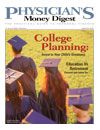Don't Judge a Finance Book by Its Cover
Consumer Reports
Can a book purchased for $30 provideas adequate and professionaladvice as a fee-only financial planner,many of whom can charge $2000 andup to develop a personal financial plan?(www.consumerreports.org) wondered the same thing. Agood book is certainly less expensive, butjust as with financial planners, not allbooks are created equal.
Blind Test of Seven
Consumer Reports
Making the Most of
Your Money
The Road to Wealth
The 9 Steps to Financial Freedom
Personal Finance for Dummies
The Motley Fool
Personal Finance Workbook
Smart Women Finish Rich
Pay Yourself
First: The African American Guide to
Financial Success and Security
recentlytested seven personal-financebest sellers: (Simon & Schuster;1997) by Jane BryantQuinn; (Riverhead Trade; 2003) and(Random House;2000) by Suze Orman; (Wiley; 2003) by Eric Tyson; (Simon & Schuster;2003); (Broadway;2002) by David Bach; and (Wiley;2001) by Jesse B. Brown.
Judged in a blind test, the books werestripped of their covers, cut up by topic,and numbered by section, with all referencesto titles and authors blacked out.They were then presented to 32 experts in10 fields for evaluation, two personal-financegeneralists, and an AfricanAmerican financial expert.
Winners and Ratings
Making the Most of Your Money
The Road to Wealth
Personal Finance for Dummies, Smart Women Finish
Rich, The Motley Fool Personal Finance Workbook,
The 9 Steps to Financial Freedom
Pay Yourself First
Overall, the reviewers ratedand "very good." Both books providedetailed, comprehensiveinformation on the most important personal-financesubjects, such as estate planning. The following books,listed in order of ratings, were assessed as "good":and . The reviewersrated "fair."
Consumer Reports
Smart Women Finish Rich
According to , despite the commercialsuccess experienced by each of these books,most of the books fell short in terms of providingreaders with reliable advice and information to helpthem make sound financial decisions. Notably absentwas information on health, homeowner's, and autoinsurance. Moreover, some of the advice providedwas either unwise or outright dangerous. Whileclaims that it's okay toleave half of your 401(k) money in your employer'sstock, most learned financial planners consider thatdecision a risky allocation. In addition, the booksdevoted to women and African Americans missedopportunities to tailor guidance to their audiences.
Consumer Reports
As a final note, suggests thatif you truly seek financial advice, don't limit yourselfto a book. Computer programs such asQuicken or Microsoft Money can help with sortingout expenses and assessing net worth. However, ifyou don't have the time to do it yourself, make sureto get the advice of a well-recommended financialadvisor.
